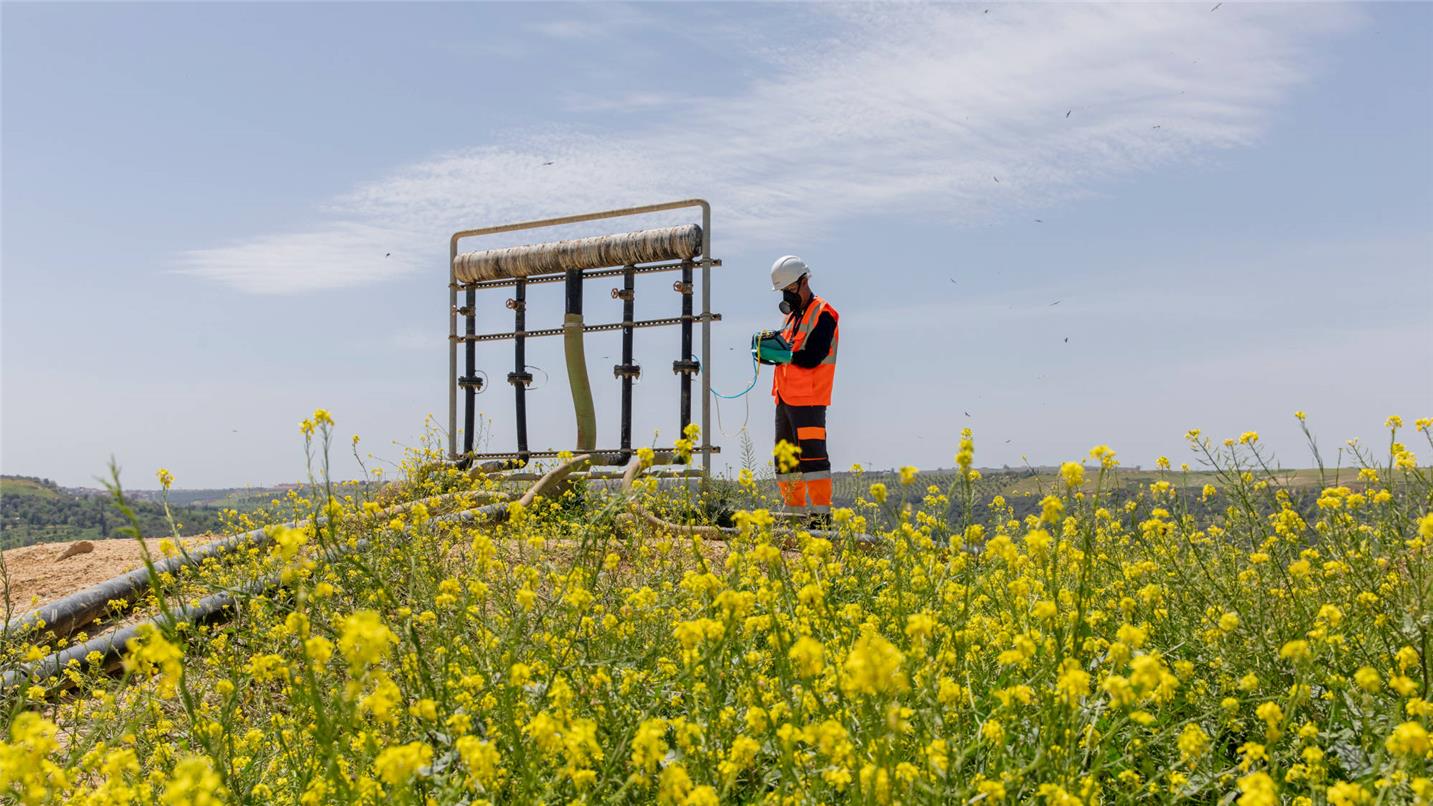The mission: transforming an unauthorised dump into an exemplary waste recovery centre
The people of Meknès had been using an uncontrolled rubbish dump stretching over 25 hectares and located 5 km from the city. Every year, 185,000 tonnes of waste produced by the 650,000 inhabitants of all the localities covered by the Meknès urban authorities were dumped at the site.
Mountains of waste built up at the dump, damaging the environment and representing both a health risk to the local residents and an ecological threat to the water table and the ecosystem. On the social front, informal waste sorters lived and worked at the site, collecting and selling recyclable materials (plastics, ferrous and non-ferrous metals etc.).
Under Morocco’s national programme for household waste management, which aims to recycle 20% of household waste by 2020, the Meknès city authorities responded to this situation by issuing a call for tender in 2013 to rehabilitate the rubbish tip and to create and develop a modern waste disposal and recovery centre. The 20-year outsourced management contract was awarded to SUEZ in January 2014.
Mountains of waste built up at the dump, damaging the environment and representing both a health risk to the local residents and an ecological threat to the water table and the ecosystem. On the social front, informal waste sorters lived and worked at the site, collecting and selling recyclable materials (plastics, ferrous and non-ferrous metals etc.).
Under Morocco’s national programme for household waste management, which aims to recycle 20% of household waste by 2020, the Meknès city authorities responded to this situation by issuing a call for tender in 2013 to rehabilitate the rubbish tip and to create and develop a modern waste disposal and recovery centre. The 20-year outsourced management contract was awarded to SUEZ in January 2014.
Our solution: building the only site of its kind in Africa working simultaneously for the climate, the environment and social integration
SUEZ took charge of designing, developing and equipping the 56-hectare site, which receives waste from all the municipalities in the Meknès area. The centre includes a 3,000 m² sorting hangar. The solutions deployed are able to capture biogas, sort and recycle materials and produce compost.
Reducing greenhouse gas emissions through biogas capture and recovery
The biogas produced by landfill waste is captured via wells bored into the mass of waste after it is covered. The gas is then routed via a network of overhead pipes to the recovery unit, where it is used as an energy source to heat-treat concentrates. SUEZ also plans to convert biogas into electricity and potentially to power the kilns at the nearby brickworks.
Protecting the natural environment by treating the polluted water emerging from the waste, known as leachate
Setting a unique example in Morocco, the leachate treatment at the site guarantees a quality level high enough for discharge into the natural environment and produces water that can be used for irrigation. The treatment combines an ultrafiltration membrane bioreactor and a reverse osmosis filtration station with sludge drying and heat treatment of the concentrates (SUEZ’s patented EVALIX™ process).
Organic and green waste recovery thanks to a composting platform
An area of 7,000 m² is used to produce compost from green waste and certain types of organic waste. The compost is used to improve agricultural soil and green spaces.
A cooperative for Meknès’ informal waste sorters, “Attadamoun*”
Another feature of the project is the emphasis it places on the social integration of the 180 informal waste pickers at the site. Earning a living for years by selling any recoverable waste they find at the site (plastics, ferrous and non-ferrous metals etc.), these workers are an important part of the project, as they are responsible for sorting and reselling recyclable materials within the new centre.
SUEZ helped the sorters to set up a cooperative called Attadamoun, created in 2014, to keep their activity going and provide an income in the long term, while also improving their working and safety conditions. Putting the sorters’ work on a formal economic footing facilitated their social integration and resulted in the creation of a recognised “sorter” status. The project’s social innovations include:
* “Solidarity” in Arabic
SUEZ helped the sorters to set up a cooperative called Attadamoun, created in 2014, to keep their activity going and provide an income in the long term, while also improving their working and safety conditions. Putting the sorters’ work on a formal economic footing facilitated their social integration and resulted in the creation of a recognised “sorter” status. The project’s social innovations include:
- supporting the sorters through all the stages of the restructuring project;
- assistance from the social mediator and the operator to prepare the cooperative’s business plan and forge commercial relationships with potential customers for recovered materials;
- providing technical, commercial, accounting and management training;
- the operator’s responsibility for investing in basic infrastructure (sorting hangar, cloakrooms, toilets, offices, grouping/storage platform, roads) and a proportion of the operating costs during the cooperative’s launch phase (personal protective equipment, equipment for storing and transporting the sorted materials).
* “Solidarity” in Arabic
The results: reducing CO₂ emissions and social progress
The site manages 200,000 to 330,000 tonnes of household waste a year and treats 56,000 m3 of leachates. The site’s biogas capture reduces its CO2 emissions by 20,000 tonnes a year.
The social aspect of the project, which involves local authorities, the Meknès municipal authority, sorters’ representatives and SUEZ, has brought an end to child labour and improved the sorters’ working conditions, income and quality of life.
The social aspect of the project, which involves local authorities, the Meknès municipal authority, sorters’ representatives and SUEZ, has brought an end to child labour and improved the sorters’ working conditions, income and quality of life.
SUEZ fights global warming in Morocco with the elimination and valorisation center
Credit: SUEZ group
Read more

Recovery and waste management
Discover our expertise
